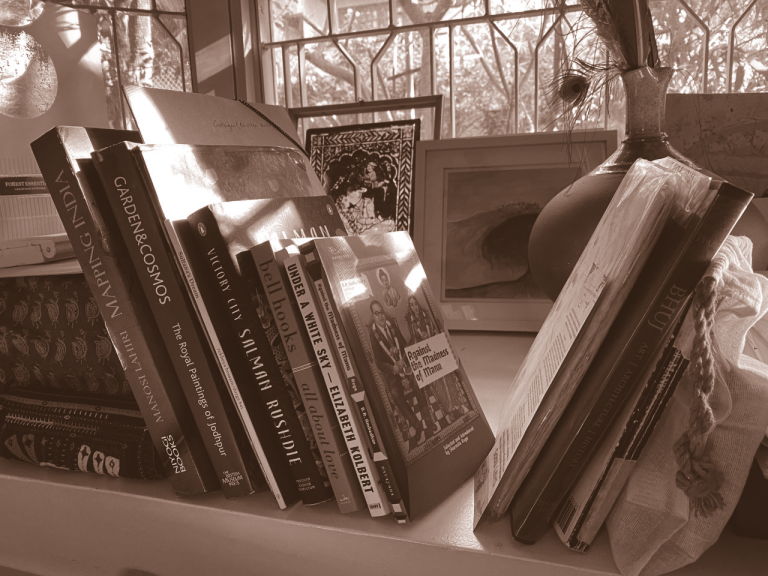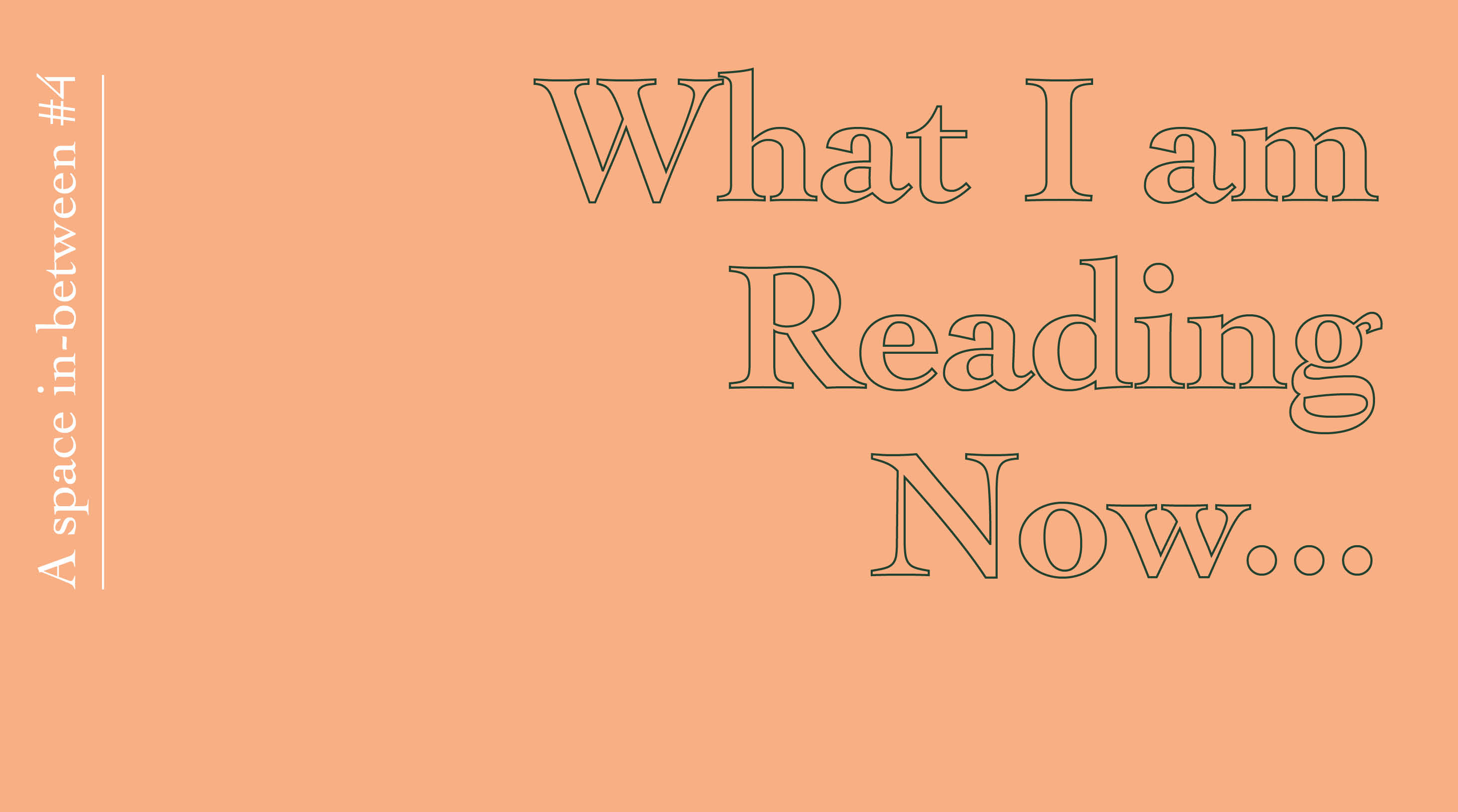What I am Reading Now…
Varsha Nair
March 2023
The invitation comes as I am in the midst of sorting books. Packing to move studio is turning out to be a slow process – browsing, revisiting, losing myself – the books don’t leave my hands easily. A few are added to the pile on the floor to let go but are soon rescued to join the ones packed away. Added to what I am reading now is what I am re-reading now, stopping to ponder over lines I have previously underlined.
In one of my favourite books, Too Loud a Solitude by Bohumil Hrabal, Hanta, the narrator has been compacting discarded books and art prints, banned ones included, and educating himself secretly using all that he rescues. The story, set in Socialist Czechoslovakia in the 70s presents both the unstoppable spread and indestructability of knowledge, and the danger of knowing. As Hanta says, “…I can’t quite tell which of my thoughts come from me and which from my books, but that’s how I’ve stayed attuned to myself and the world around me for the past thirty-five years.” The books I read, besides searching/discovering, are also an attempt to understand the complexities of the world around me, to attune myself – find a way of being.
Since the late 90s, which is when I first read The Laws of Manu – an ancient text that constructs Hindu society and plainly outlines caste divisions and women’s lesser position, I have been handling pages of the book, punching and performing with them, collaging to offer a reordering as an antidote in and through the work. Having exhibited parts of this ongoing series in various distant places I ask myself if I will ever be able to safely install it here given the current political climate.
One of the books in the pile on my table, all at various stages of being read, is Against the Madness of Manu – B.R. Ambedker’s reading into Laws of Manu and unpicking of Brahmanical Patriarchy. Compiled by sociologist Sharmila Rege, her selection provides an insight on how and why Ambedkar laid the base for a feminist take on caste and how the caste system thrives by its control of women.
In August 2021, The University of Delhi axed Bengali writer and activist Mahasweta Devi’s revolutionary short story Draupadi from its popular Women’s Writing course offered for the BA English Honours syllabus. This subversive story narrates a tale about a tribal woman’s self-empowerment in the overbearing face of a patriarchal State. Devi’s writings exposing the inherently vicious systems in Indian society continue to be highly relevant in contemporary times when violence against women, oppression of Dalits, Muslims and other minorities has escalated in recent years.
You can imagine what a pleasure it is to hold again Sultana’s Dream written in 1905 by the pioneering Muslim feminist, Begum Rokeya Sakhawat Hossain, and run my fingers over the beautiful illustrations by the accomplished Gond artist Durga Bai. Championing women’s liberation Begum Rokeya penned this vision of Sultana waking up in ‘Ladyland’ where women claim public space, roles are reversed and men not women are cloistered within zenanas. Their scientific knowledge and engineering prowess is focused on living in harmony with nature – all infused with care and love that triumphs over fear, aggression and hatred.
I underlined these words by bell hooks in the introduction to her book all about love. ‘Reviewing the literature on love I noticed how few writers male or female, talk about the impact of patriarchy, the way in which male domination of women and children stands in the way of love.’
On a different but somewhat connected thread, I have been slowly making my way through Under A White Sky by Elizabeth Kolbert. Examining the impact of humans on the environment, our eluded sense of and quest to control nature and the eco systems we have harmed, Kolbert’s writing presents the realities of the climate crisis; how far scientists have gone to re-engineer the planet, “manufactured nature”, and how far we must go to find a new balance. In stark terms – finding ourselves now between a rock and a hard place and having to look for solutions to urgently tackle previous botched efforts.
Well over a decade after Sultana’s Dream, yet another fantastical story revolves around a woman and her might and creativity. She, as the vessel of a goddess seeds a glorious kingdom into existence and sets out to fulfil the goddess’s wish to give women equal agency in a patriarchal world. The historical fiction is inspired by the Vijayanagara empire which covered most of South India in the 15th and 16th centuries. Vijayanagara is a real place which I have visited, and I am excited to revisit through the tantalizing alchemy of words woven together in Salman Rushdie’s Victory City. Starting with a story inscribed with the past he presents a window on current reality, of the power-play locking us in divisive battles of caste, religion, and identity. Then, as I browse re-discovered treasures, I find on one of the shelves, City Of Victory Vijayanagara, The Medieval Hindu Capital Of Southern India (Aperture 1991), a book with spectacular black and white photos of the place that is also known as Hampi.
Varsha Nair is an interdisciplinary artist based in Baroda, India, where she studied at the Faculty of Fine Arts, Maharaja Sayajirao University. Her works and projects have been exhibited internationally, most recently at documenta 15, Kassel. As co-organizer of Womanifesto in Thailand, Varsha has been instrumental in conceptualising projects that stretch beyond the traditional model of biennial exhibition-making to produce intergenerational and cross-disciplinary workshops, collaborations, and networks. Her texts have been published in n.paradoxa, Southeast of Now: Directions in Contemporary and Modern Art in Asia, and Ctrl+P Journal of Contemporary Art of which she is Editorial Board member. Varsha is a Guest Lecturer on the Masters of Arts Program at HSLU, Lucerne University of Applied Sciences and Arts.
Reading
Breast Stories: Draupadi, Breast Giver, Choli ke Pichhe, Mahasweta Devi. Translated by Gayatri Chakravorty Spivak (Seagull Books Calcutta, 1997)
Against the Madness of Manu, B.R. Ambedker’s writings on Brahmanical Patriarchy. Selected and Introduced by Sharmila Rege (Navayana Publishing, 2013)
All About Love, bell hooks (HarperCollins, 2018)
Under A White Sky: The Nature of the Future, Elizabeth Kolbert (Crown Publishing, 2022)
Victory City, Salman Rushdie (Penguin Random House India, 2023)
Listening

Please note the views published in What I am Reading Now… are personal reflections of the contributors.
These may not necessarily represent the views of the University of Dundee.
———
Previous Issue: Marie Hélène Pereira, February 2023
Next Issue: Rosa-Johan Uddoh, April 2023
